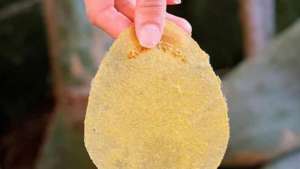First Published in
In the rural village of Raaswater, 16km from Upington in the Northern Cape, lives Themba Masala, a skilled papier-mâché engineer, crafter and painter. In 2002 he started his own craft enterprise, Raaswater Paper Craft and Design. Eight years later he employs 20 people and supplies a number of retail outlets in South Africa, while also exporting to France, Switzerland and Germany. In fact, business has increased so rapidly that, for the past three years, Masala and his team haven’t been able to keep up with market demand.
Industrialising these crafts enterprises is the next logical step in turning a rural village into a wealthy town, believes Leonard Shapiro, director of CraftSouthAfrica, an organisation aiming to develop sustainable craft enterprises that generate wealth in rural areas. “Take Carrol Boyes for example,” says Shapiro. “In 1989 she began designing pewter cutlery, entered the market and grew until a point that she was able to supply retailers nationally. The normal business development principles that apply to her growth should apply to any crafter’s growth.”
The production of crafts has become a considerable contributor to the economies of many developing countries. Craft enterprises in India, South America and Asia have grown at such a rate that many have had little choice but to step up and industrialise the production of their enterprises in meeting the ever-demanding market. South Africa, unfortunately, still lacks the necessary support needed to take craft enterprises such as Raaswater Paper Craft and Design to the next level.
It was through Shapiro’s 18-month mentorship that Masala was able to grow his enterprise to where it is today, but Shapiro explains that even through his assistance, Masala was only able to build a solid production foundation that allowed him to continue producing crafts to satisfy his clients. While he may employ 20 people, the space in which they work only has a capacity to hold eight with the rest forced to work outside, scampering for shade as the sun moves across the day. There is enough land in Raaswater on which Masala can build his workshop and, while he has enough money to buy the land, building a factory with the necessary machinery is beyond his means.
Raaswater isn’t the only enterprise that has the potential for industrial development. In South Africa, a small but increasing number of craft enterprises are at the point where they are ready to be industrialised, but involvement of the relevant role-players is needed to direct and facilitate this vital process. Although poverty alleviation funding from the National Treasury focuses on creating sustainable crafts enterprises based on the use of hand skills, no funding has as yet been allocated to the industrialisation of these enterprises and complementary technological skills.
Shapiro gives good reason for the growing need for government and non-government role-players to focus on industrialising craft. If Raaswater Paper Craft and Design is to continue production and keep up with the demands from local and international clients, it urgently needs funding to build a factory, which will additionally allow Masala to employ more people.
There are concerns that surround industrialising and mechanising craft, and creating product-line workshops to assist in keeping up with production. In the past, industrialisation has resulted in the loss of jobs as machines took the place of people. “I think jobs would actually increase as there would still be a great deal of handwork involved in the production processes. At the same time, you are buying more materials and exporting more products, which means you will need to hire more people to manage these expanding facets of the enterprise,” insists Shapiro, also adding that the wealth injection would further create more jobs in the surrounding community.
Despite a strong case, Masala does not have the backing necessary to help grow his business and it is not without consequence that crafts are still considered small, “cutesy” items. “Many development organisations have for a long time defined crafts as needing to be produced on a ‘small scale’. It is only by changing this frame of mind that investors will understand the industrialisation of craft as a means to boost wealth in the rural communities,” Shapiro explains. Sadly, however, because very few craft enterprises ever reach this point, the necessity and value to sustain and continue growing them is rarely acknowledged.
In the meantime, Themba Masala will continue to produce his crafts from his current smallholding, hoping to revive the village of Raaswater into what could become a self-sufficient industrial town. He will continue to exhibit his designs and export them to his clients internationally. And, he will continue to run on the spot until the vision of a fully industrialised craft production factory is realised. Then only, will Raaswater Paper Craft and Design herald a new era for the South African craft industry.













